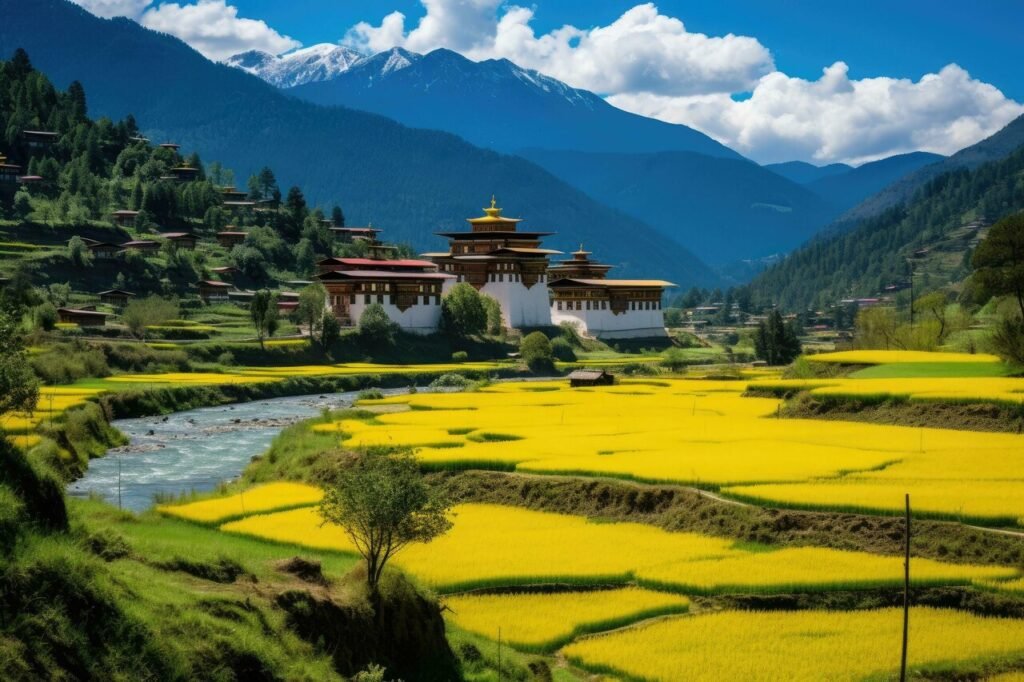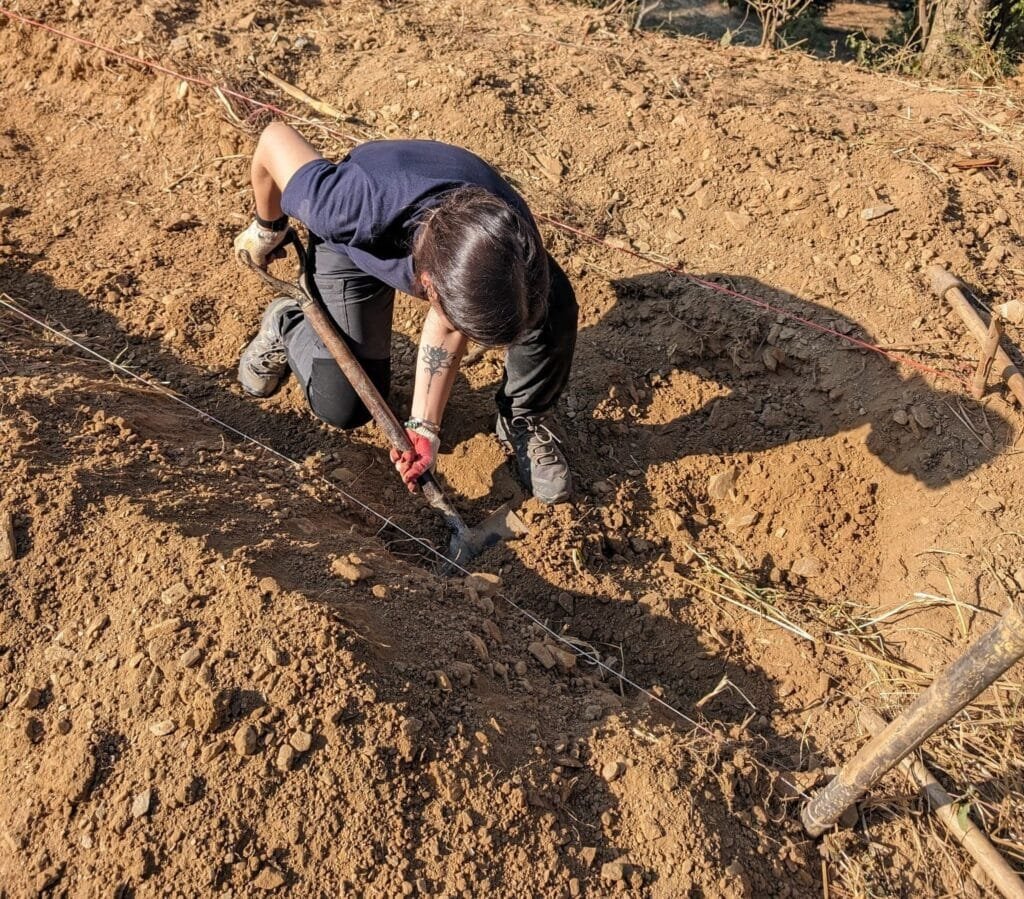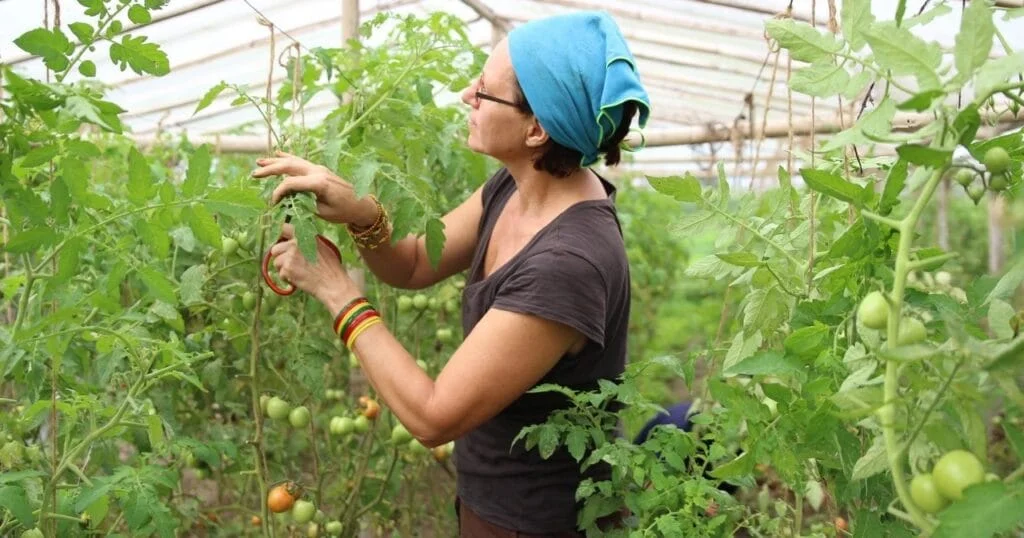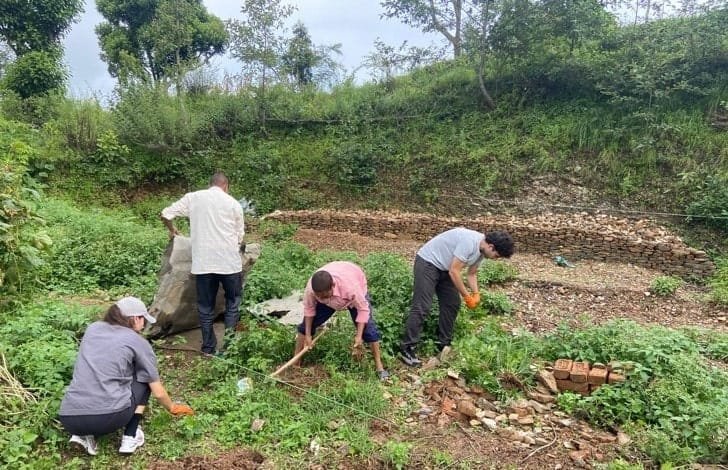Buddhist Monastery Permaculture Volunteer in Nepal: Cultivate Sustainability, Empower Communities, and Nurture Sacred Land
Discover a unique opportunity to blend environmental conservation with spiritual growth as a Monastery Permaculture Volunteer in Nepal. This transformative project invites passionate individuals to engage in Eco-Garden Volunteering in Monasteries and contribute to Sustainable Agriculture Monastery Programs. By joining us, you will help develop organic farming practices, design eco-friendly gardens, support composting initiatives, and promote a holistic approach to environmental stewardship within a Buddhist monastery setting.
Our project is designed for eco-conscious volunteers, organic farming enthusiasts, sustainable agriculture advocates, and those interested in Volunteer Organic Farming in Nepal. With a focus on Monastic Sustainable Gardening Projects and Permaculture Design in Monastic Settings, you will play an essential role in the Volunteer in Monastery Herbal Gardens initiative, while also learning about composting and sustainable practices that have a lasting impact.
In this comprehensive guide, we outline every aspect of the Buddhist Monastery Permaculture Volunteer project—from project overview and description to roles and responsibilities, daily activities, required skills, cultural experiences, logistics, impact, success stories, application process, FAQs, and an inspiring call to action. Read on to learn how you can join our mission of environmental conservation and community empowerment in one of Nepal’s most sacred settings.
1. Overview
Buddhist Monastery Eco-Garden & Permaculture Volunteer Project : Cultivate Sustainability, Nurture Sacred Land, Empower Communities
| Topic | Description | |
|---|---|---|
| 🌱 | Organic Farming | Engage in hands-on organic farming practices to boost sustainable agriculture at the monastery. |
| 🌿 | Eco-Garden Volunteering | Help design and maintain eco-friendly gardens, enhancing the monastery’s natural landscape. |
| 💧 | Water Conservation | Implement efficient irrigation systems and water-saving techniques for long-term sustainability. |
| ♻️ | Composting Initiatives | Set up and manage composting systems to recycle organic waste into nutrient-rich soil amendments. |
| 🌾 | Permaculture Design | Contribute to sustainable garden layouts using permaculture principles in monastic settings. |
| 🌸 | Herbal Garden Development | Cultivate and maintain monastery herbal gardens to preserve traditional medicinal plants. |
| 🛠️ | Infrastructure Support | Assist with repairs and minor construction projects that enhance monastic sustainable gardening. |
| 🎓 | Community Workshops | Lead training sessions on organic farming, permaculture, and eco-friendly practices for local staff. |
| 📊 | Documentation & Reporting | Record progress and outcomes to support ongoing conservation and cultural heritage efforts. |
| 🤝 | Cultural Immersion | Experience life in a Buddhist monastery while engaging in local traditions and sustainable living. |
The Buddhist Monastery Permaculture Volunteer project in Nepal is an immersive initiative focused on creating sustainable, organic gardens within the monastery grounds. Volunteers engage in eco-friendly practices, including Organic Farming Volunteer Nepal activities, Composting Initiatives in Monasteries, and Permaculture Design in Monastic Settings. This program supports Monastic Sustainable Gardening Projects and offers hands-on experience in Eco-Garden Volunteering in Monasteries—all aimed at promoting sustainable agriculture and environmental conservation.
2. Project Description
Introduction
Our project is dedicated to transforming monastery grounds into thriving eco-gardens that produce organic food, medicinal herbs, and native plants using sustainable methods. The Buddhist Monastery Permaculture Volunteer initiative encourages volunteers to work side by side with local monastic communities to design, implement, and maintain eco-friendly gardens. This project supports Sustainable Agriculture Monastery Programs and fosters practices that benefit both the environment and the spiritual community.
Background
Nepal, known for its rich cultural and spiritual heritage, is also home to diverse ecosystems that are increasingly threatened by climate change and unsustainable farming practices. Monasteries have long been centers of knowledge and conservation, but many struggle with maintaining traditional agricultural practices amid modern challenges. Our project addresses this need by integrating Eco-Garden Volunteering in Monasteries with modern sustainable agriculture techniques. Through Organic Farming Volunteer Nepal efforts and Monastic Sustainable Gardening Projects, we aim to restore native flora, support local biodiversity, and create resilient food systems.
Key Objectives
- Sustainable Land Management: Transform monastery grounds using permaculture principles to create organic gardens and support Sustainable Agriculture Monastery Programs.
- Eco-Friendly Practices: Implement composting, water conservation, and organic farming techniques to minimize environmental impact.
- Herbal Gardens: Develop and maintain monastery herbal gardens to preserve traditional medicinal plants, aligning with Volunteer in Monastery Herbal Gardens initiatives.
- Educational Outreach: Train monks and local community members in sustainable agriculture and Permaculture Volunteering practices.
- Cultural Preservation: Integrate traditional Buddhist values with modern environmental conservation to foster a holistic approach to sustainability.
3. Why Volunteer for This Project?
The Need
Nepal’s fragile ecosystems and vulnerable agricultural practices require immediate intervention. Unsustainable farming has led to soil degradation, water scarcity, and loss of native species. Studies indicate that sustainable agriculture practices can improve soil fertility by up to 40% and boost local crop yields significantly. By joining our project, you will be directly involved in Organic Farming Volunteer activities and contribute to lasting change in environmental conservation.
Global Relevance
This initiative supports global sustainability efforts and aligns with international goals such as the UN Sustainable Development Goals (SDG 2: Zero Hunger, SDG 13: Climate Action). By participating, you contribute to Environmental Conservation Volunteer efforts that have far-reaching impacts beyond Nepal.
Local Voices
Local monks and community members are enthusiastic about reviving traditional agricultural methods. As one monastery elder expressed:
“With your help, we can transform our monastery into a beacon of sustainability and self-reliance. Our gardens are not just food sources; they are living expressions of our spiritual commitment to nature.”
This heartfelt testimonial underscores the transformative potential of Eco-Garden Volunteering in Monasteries and Monastery Permaculture Volunteer projects.
4. Volunteer Roles and Responsibilities
Our project involves a range of tasks that contribute to the holistic development of eco-gardens in monastic settings.
Core Tasks
Here are 10 core tasks volunteers will perform:
Site Assessment and Planning:
- Evaluate the monastery grounds for soil quality, water availability, and potential garden layouts.
- Develop detailed permaculture designs and plans tailored to the specific needs of the monastery.
Organic Farming Practices:
- Assist in the implementation of organic farming techniques, including crop rotation, natural pest control, and organic fertilization.
Composting Initiatives:
- Set up and manage composting systems to recycle organic waste into nutrient-rich compost.
Herbal Garden Development:
- Cultivate and maintain herbal gardens by planting, caring, and harvesting medicinal herbs.
Irrigation and Water Conservation:
- Install efficient irrigation systems and implement water-saving techniques to ensure sustainable garden practices.
Soil Health Management:
- Conduct soil tests and work on soil enrichment through natural amendments.
Community Training and Workshops:
- Lead educational workshops for monks and local community members on sustainable agriculture and permaculture techniques.
Documentation and Reporting:
- Keep detailed records of garden progress, techniques used, and outcomes achieved.
- Assist in documenting practices for future replication and Cultural Heritage Digitization of agricultural methods.
Maintenance and Harvesting:
- Regularly tend to the gardens, perform weeding, and assist with harvesting produce.
Special Projects and Innovations:
- Collaborate on developing innovative sustainable solutions, such as vertical gardens or rainwater harvesting systems.
Daily Activities: Sample Schedule
- 08:00-08:30: Breakfast and Morning Briefing
(Discuss daily goals, assign tasks, and review safety protocols.) - 08:30-10:00: Site Assessment and Planning
(Survey garden areas, inspect soil quality, and finalize daily work plans.) - 10:00-10:15: Short Break
- 10:15-12:00: Organic Farming and Garden Maintenance
(Planting, weeding, and setting up irrigation systems.) - 12:00-13:00: Lunch (Local Nepali cuisine provided)
- 13:00-15:00: Composting and Soil Management
(Manage composting systems and enrich soil with organic matter.) - 15:00-15:15: Tea Break
- 15:15-17:00: Community Workshops / Special Projects
(Conduct training sessions or work on innovative projects like rainwater harvesting.) - 17:00-17:30: Debrief and Reflection
(Review the day’s achievements and plan for the next day.) - 17:30 Onwards: Free Time / Cultural Immersion
(Engage in monastic rituals, local traditions, or relax.)
Special Projects
- Eco-Village Initiatives: Develop community-based projects that integrate permaculture with local village life.
- Innovative Water Conservation Systems: Design and implement rainwater harvesting or greywater recycling systems tailored for monastery gardens.
5. Skills and Requirements
Required Skills
- Passion for the Environment: A deep commitment to sustainable agriculture and ecological conservation.
- Physical Fitness: Ability to perform outdoor tasks and work in garden settings.
- Technical Know-How: Basic understanding of organic farming, permaculture principles, and composting processes.
Eligibility
- Open to individuals aged 18 and above.
- Ideal candidates include those with backgrounds in agriculture, horticulture, environmental science, or related fields.
Preferred Skills
- Experience in organic farming, permaculture, or sustainable gardening projects.
- Prior volunteer experience in environmental conservation or community projects.
- Strong communication and teamwork skills to effectively collaborate with local communities and monastic staff.
6. Cultural Experience
Cultural Immersion
Volunteering as a Monastery Permaculture Volunteer offers a rich cultural immersion experience. Engage deeply with the spiritual life of a Buddhist Monastery while learning traditional farming techniques and sustainable gardening practices. Enjoy authentic Nepali cuisine, participate in monastic rituals, and explore local cultural heritage sites.
Language and Traditions
- Language Classes: Optional sessions to learn basic Nepali phrases and farming terminology, enhancing your communication with local community members.
- Local Festivals and Ceremonies: Participate in cultural events and ceremonies, providing insight into the spiritual and communal life of the monastery.
- Community Engagement: Build relationships with local monks, farmers, and residents, fostering a sense of global citizenship and mutual respect.
7. Logistics and Support
Accommodation
- Living Arrangements:
Comfortable shared accommodations are provided either within the monastery compound or in nearby volunteer housing. These arrangements offer a supportive environment for both work and relaxation.
Meals
- Traditional Nepali Cuisine:
Enjoy three nutritious meals a day, prepared with fresh, local ingredients. Vegetarian options and other dietary preferences are fully accommodated.
Transportation
- Airport Pickup:
Shuttle services are provided from the airport to the monastery. - Daily Commutes:
Transportation is arranged for field trips, site visits, and local excursions.
On-Site Support
- Dedicated Coordinators:
A team of local staff and project coordinators is available 24/7 to assist with logistics, provide technical support, and offer guidance. - Technical Assistance:
On-site IT support and tools are available for digital record-keeping and efficient garden management.
Health and Safety
- Medical Support:
Regular health check-ups, on-site medical assistance, and clear emergency protocols are in place. - Insurance and Vaccinations:
Volunteers are advised to secure travel insurance and obtain necessary vaccinations according to local guidelines.
8. Program Fees and Inclusions
For a detailed breakdown of program fees and what is included (accommodation, meals, training, transportation, and more), please visit our Program Fees page.
- Booking Fee: A nominal fee is required to secure your spot in the program.
- All-Inclusive Package: Our package covers accommodation, all meals, training materials, local transportation, and on-site support throughout your volunteer experience.
9. Impact and Outcomes
Volunteer Impact
- Skill Development:
Enhance your technical and practical skills in organic farming, permaculture design, and composting initiatives. - Professional Growth:
Gain valuable experience in Sustainable Agriculture Volunteer work that can enhance your career in environmental conservation or agriculture. - Personal Fulfillment:
Experience the transformative power of sustainable living and contribute to a greener, more self-sufficient community. - Networking Opportunities:
Connect with fellow volunteers, local farmers, and monastic staff, building a network of like-minded sustainability advocates.
Community Impact
- Restoration of Sacred Land:
Through our Monastic Sustainable Gardening Projects, volunteers help restore degraded landscapes and promote biodiversity. - Enhanced Food Security:
Organic gardens and sustainable farming practices support local food supplies and improve the nutritional well-being of monastery residents. - Global Accessibility of Sustainable Practices:
Sharing our success stories and innovative practices promotes Volunteer Organic Farming in Nepal and inspires similar projects worldwide. - Environmental Conservation:
Our efforts in eco-gardening and organic farming contribute to reducing soil erosion and conserving water resources, aligning with global environmental conservation goals.
Statistic
Research indicates that sustainable agriculture practices can improve soil fertility by up to 40% and increase crop yields, demonstrating the profound impact of eco-friendly farming methods.
10. Success Stories and Testimonials
Volunteer Experiences
One former volunteer shared:
“Volunteering as a Monastery Permaculture Volunteer was a life-changing experience. I learned practical organic farming techniques and contributed to transforming a once-degraded landscape into a thriving garden. The sense of community and the spiritual connection to the land made every moment memorable.”
Local Impact Stories
A senior monk at the monastery stated:
“With your help, our eco-gardens have become a beacon of hope. The organic farming and sustainable practices have not only improved our food security but also deepened our connection to nature and our spiritual values.”
These testimonials highlight the profound personal and community impacts of our project, showcasing how Eco-Garden Volunteering in Monasteries and Sustainable Agriculture Monastery Programs are making a difference.
11. Application Process
Steps to Join
- Complete the Online Application:
Visit our Apply Now page and fill out the application form with your personal and professional details. - Submit Your Resume:
Attach your CV and include two professional or academic references that demonstrate your experience or passion for sustainable agriculture and environmental conservation. - Await Confirmation:
Look out for a confirmation email with further instructions and details about your volunteer role. - Pay the Booking Fee:
Secure your spot by paying the required program booking fee (typically €150). - Receive the Pre-Departure Pack:
Get comprehensive guidelines, training materials, and cultural orientation information before departure. - Final Payment:
Process the remaining program fee upon arrival or via secure online payment.
12. Frequently Asked Questions (FAQs)
What is the Buddhist Monastery Permaculture Volunteer project?
This project involves volunteering in a Buddhist monastery in Nepal to implement sustainable agriculture practices. Volunteers work on eco-gardening, organic farming, and composting initiatives to transform monastery grounds into thriving organic gardens.
Who can participate in this program?
The project is ideal for individuals aged 18 and above with a passion for sustainable agriculture, environmental conservation, and cultural heritage. Librarians, agriculturists, environmental science students, and eco-conscious volunteers are encouraged to apply.
What tasks will volunteers be expected to perform?
Tasks include site assessment, digital mapping of garden areas, organic farming, composting, planting, soil management, community training, and assisting with special projects. Volunteers will also participate in daily workshops and environmental conservation activities.
How long is the volunteer program?
The program duration is flexible and can range from a few weeks to several months based on group needs and volunteer availability.
Is accommodation provided during the program?
Yes, comfortable shared accommodations are provided within the monastery or nearby volunteer housing, along with thrice-daily meals and local transportation.
What kind of support is available on-site?
A dedicated team of local coordinators and technical staff is available 24/7 to provide guidance, resolve technical issues, and ensure a smooth volunteer experience.
How do I apply for the Buddhist Monastery Permaculture Volunteer project?
Simply visit our Apply Now page, complete the application form, and follow the steps outlined in our application process. Include your resume, cover letter, and references.
13. Join us
Join Our Buddhist Monastery Permaculture Volunteer Project Today!
Step into a role where sustainable agriculture meets spiritual heritage. Become a Monastery Permaculture Volunteer in Nepal and contribute to transforming monastery grounds into thriving eco-gardens through Eco-Garden Volunteering in Monasteries. Your work will help build Sustainable Agriculture Monastery Programs, support Organic Farming Volunteer Nepal initiatives, and promote environmental conservation.
- Volunteer: Engage directly in organic farming, composting, and eco-gardening projects that have a lasting impact on the environment and local communities.
- Learn and Grow: Acquire practical skills in sustainable agriculture and permaculture design while experiencing the rich cultural heritage of a Buddhist monastery.
- Make a Global Impact: Contribute to environmental conservation and sustainable food systems that inspire change on a global scale.
Visit our Apply Now page and secure your spot today. For additional inquiries, please get in touch with us at support@vin.org.np.
Your passion for sustainable living can transform sacred land into a beacon of hope and environmental stewardship. Share this opportunity with friends, family, and colleagues eager to make a difference. Together, we can cultivate a greener future, one garden at a time.
Gallery



